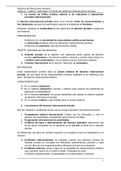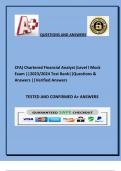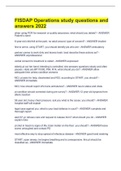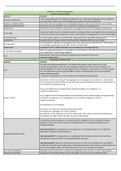Global Marketing Innovation Lecture & Article Summaries
, Global Marketing Innovation Lecture & Article Summaries
Week 1
Book, Chapter 1:
Challenges and opportunities of global marketing:
Challenges:
- Cultural differences: Every country has its own unique culture, language, and customs that
affect consumer behavior and perceptions of products and services. Companies must
understand these differences and tailor their marketing strategies accordingly to be
successful in different markets.
-Economic differences: Countries have different levels of economic development, income
levels, and market sizes. Companies must consider these differences when developing
pricing and distribution strategies.
- Political and legal differences: Laws and regulations vary widely from country to country,
and companies must navigate these differences to avoid legal problems and ensure
compliance with local regulations.
Opportunities:
- The global marketplace offers a vast array of potential customers and allows companies to
reach new markets and expand their customer base.
- It also allows businesses to leverage economies of scale and reduce costs by centralizing
production and distribution.
- Advances in technology, such as the internet and social media, have made it easier for
businesses to connect with customers around the world and tailor their marketing messages
to specific markets.
The definition of global marketing and its importance:
Green and Keegan define global marketing as "the process of conceptualizing and
conveying a final product or service worldwide with the hopes of reaching the international
marketing community."
In other words, global marketing involves developing and implementing marketing strategies
that target customers in multiple countries or regions.
, Global Marketing Innovation Lecture & Article Summaries
The importance of global marketing lies in the fact that the world has become increasingly
interconnected and globalized.
- Companies that operate only domestically risk missing out on opportunities to reach new
customers and expand their businesses. Global marketing allows companies to access new
markets and take advantage of economies of scale by centralizing production and
distribution.
- Essential for companies that want to remain competitive in today's business environment.
In many industries, competition is no longer limited to domestic markets, and companies
must compete with rivals from around the world. To succeed in this global marketplace,
businesses must develop sophisticated global marketing strategies that take into account
cultural, economic, and political differences across different countries and regions.
Green and Keegan discuss the differences between domestic and international marketing,
highlighting that global marketing requires a more complex and sophisticated approach.
Domestic marketing refers to the process of promoting and selling products or services
within a single country's borders.
In contrast, international marketing involves promoting and selling products or services in
multiple countries or regions.
Global marketing takes this a step further by creating marketing strategies that can be
applied to multiple countries or regions simultaneously.
The primary difference between domestic and international marketing is the complexity of
the international environment. Global marketing requires companies to navigate different
cultural, economic, political, and legal environments in each country or region they operate
in. This means that businesses must adapt their marketing strategies to fit the unique
characteristics of each market.
For example, a marketing campaign that works well in the United States may not resonate
with consumers in Japan, where cultural norms and consumer behavior are very different.
Similarly, pricing and distribution strategies that are effective in one country may not work in
another due to differences in economic development or infrastructure.
Global marketing requires companies to manage a complex network of suppliers,
distributors, and other partners across multiple countries or regions. This requires a
sophisticated approach to supply chain management and logistics.
, Global Marketing Innovation Lecture & Article Summaries
Green and Keegan discuss various environmental factors that affect global marketing,
including cultural, economic, political, and technological factors. They emphasize the
importance of understanding these factors and adapting marketing strategies accordingly to
be successful in different countries and regions.
Cultural factors refer to the values, beliefs, customs, and behaviors of a society. Different
cultures have different preferences and expectations when it comes to products and
marketing messages. Companies must be aware of these differences and adapt their
marketing strategies accordingly.
For example, a marketing campaign that emphasizes individuality and self-expression may
be effective in the United States but may not resonate with consumers in more collectivist
cultures like Japan.
Economic factors include the level of economic development, income levels, and market
size in a given country or region. Companies must consider these factors when developing
pricing and distribution strategies. For example, a high-priced luxury product that is
successful in developed markets may not be affordable or desirable for consumers in less
developed markets.
Political factors include laws, regulations, and political stability in a given country or region.
Companies must navigate these factors to avoid legal problems and ensure compliance with
local regulations. For example, some countries have strict regulations around advertising
and marketing, which can limit the types of marketing campaigns companies can run.
Technological factors include advances in technology, such as the internet and social
media, which have made it easier for companies to connect with customers around the world
and tailor their marketing messages to specific markets. Companies must stay up to date
with these technological changes to remain competitive in the global marketplace.
Entry modes:
Exporting involves producing goods in one country and selling them in another. This is a
relatively low-risk and low-cost entry mode, but it may not be the most effective way to
penetrate a new market.













